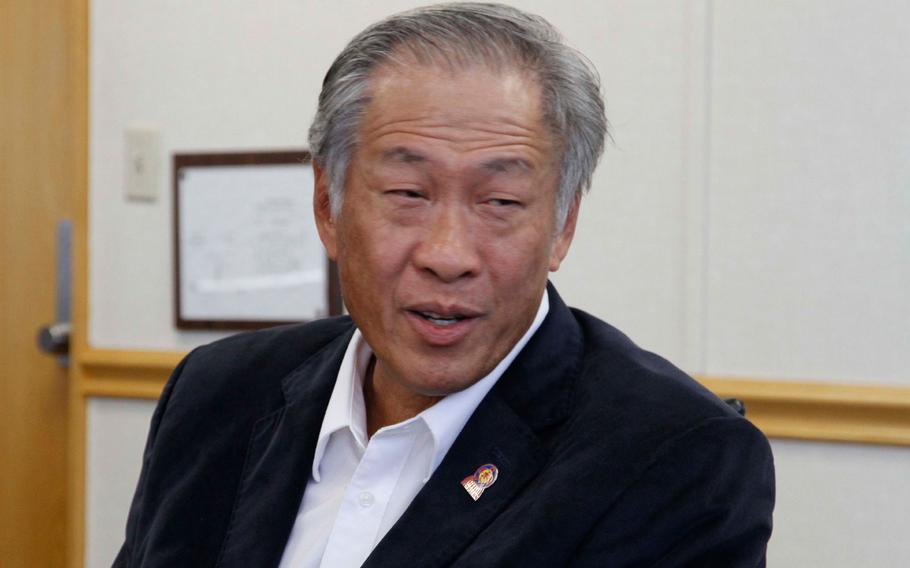
Ng Eng Hen, Singapore defense minister, tells reporters during a news conference Sept. 30, 2016, at Join Base Pearl Harbor-Hickam, Hawaii, that Islamic State-inspired terrorism in Southeast Asia is a core concern of the region’s military leaders. (Wyatt Olson/Stars and Stripes)
JOINT BASE PEARL HARBOR-HICKAM, Hawaii — The threat of expansion of terrorist cells from the Middle East into Southeast Asia is “uppermost” in the minds of defense ministers in that region, Singapore’s defense minister said Friday.
Ng Eng Hen told reporters that dealing with Islamic State-inspired extremists in the region had been a main topic during this week’s meeting in Hawaii of defense ministers from member countries of the Association of Southeast Asian Nations. U.S. Defense Secretary Ash Carter joined the informal talks on Friday.
“Every year we meet, the situation and the threat of extremist terrorism rises,” Ng said. Compared even to a year ago, he said, the extremists are more organized.
“They are more networked,” he said. “They are more clear in their articulation of what they want to achieve.”
Earlier in the day Carter told reporters that he’d asked the Asian Pacific Center for Security Studies to host an ASEAN counter-terrorism workshop next year. He directed the center, which is located in Honolulu and is under U.S. Pacific Command, to identify “any gaps that might exist in U.S.-ASEAN cooperation on countering violent extremism – and close those gaps.”
Carter said he’d asked PACOM Commander Adm. Harry Harris to invite ASEAN partners to participate in a maritime domain awareness exercise in 2017 to improve the sharing of information. He’s also asked top officials of the U.S. Navy and Coast Guard to hold a U.S.-ASEAN maritime dialogue next year to share best practices.
Harris on numerous occasions has warned about the potential of Islamic State recruits returning to Asia, which he has described as the terrorist organization’s own “rebalance” to the Pacific from the Middle East.
Individuals claiming links to the Islamic State group have already struck in parts of Southeast Asia.
In January, in Indonesia, four people died in an attack using bombs and firearms, and in July militants killed hostages and police officers in Bangladesh.
The Islamic State claimed responsibility for both attacks.
Ng said that a “unit” of the Islamic State group in the vast Malay archipelago has “the declared goal of establishing an Islamic caliphate in our part of the world in ASEAN.”
“They’ve gone beyond networks to push the flow of funds, weapons,” he said. “They are already plotting. Recently Indonesian authorities captured, or unearthed, a cell that was coordinated by a resident from ASEAN, but [living] in Syria, with the specific intent of shooting down hotels and other places in our Marina Bay area in Singapore.”
He said that as the Islamic State group is “diminished or dismembered” in Iraq and Syria, Southeast Asia will suffer in the short-term as the roughly thousand foreign fighters leave the Middle East.
Some will be “re-energized” and well trained, he said.
Ng said the gathered defense ministers had lauded the Philippines, Malaysia and Indonesia for forming patrols of the Sulu Sea, a body of water that has an entrenched network of weapons and human smuggling, including extremists.
The ministers were generally receptive to Carter’s proposal for increased counter-terrorism exercises between ASEAN nations and the U.S.
Singapore has already fully embraced that multilateral approach, Ng said.
Singapore co-organized a counter-terrorism exercise earlier this year with Brunei, Australia and New Zealand that hosted 18 countries and 3,000 personnel. Special forces units conducted drills that involved storming facilities and hostage-rescue scenarios, he said.
Olson.wyatt@stripes.com Twitter: @WyattWOlson